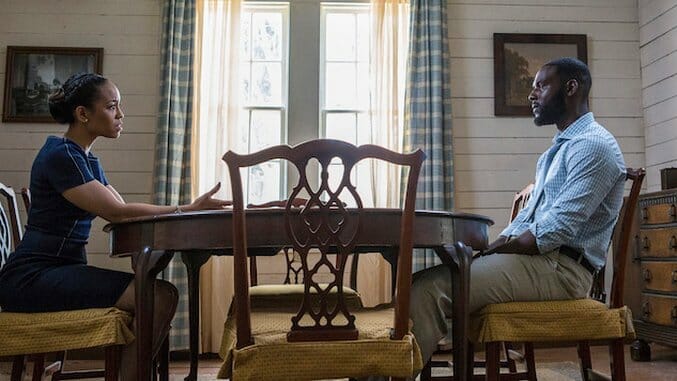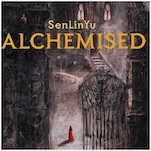Queen Sugar’s “I Know My Soul” Is a Portrait of Painful Self-Discovery
(Episode 2.07)
Photo: Skip Bolen © 2017 Warner Bros. Entertainment Inc / Courtesy of OWN.
Picking up from the explosive conclusion of “Line of Our Elders,” in which Ralph Angel revealed their late father’s additional will and testament left the land to him alone, tensions are still high in “I Know My Soul,” as Charley (Dawn-Lyen Gardner), Nova (Rutina Wesley), Aunt Vi (Tina Lifford) and Ralph Angel continue their argument. Ralph Angel checks both of his sisters for their lack of help with their father, throwing Charley’s absence in series premiere in her face: If she had done what their father asked of her, he says, this conflict could’ve been avoided.
In tonight’s episode, the Bordelons are more at odds than ever, as Ralph Angel’s patience with his sisters runs thin and he fights for the responsibility of running the farm on his own. You can’t help but understand his frustration at being underestimated, but his obsession over living up to his father’s expectations often inflates his ego—and his stubbornness.
In private, Charley and Nova are conflicted, separately expressing to Aunt Vi the hurt they’ve silently carried, coming to terms with being excluded. Nova finally opens up about her strained relationship with her father, who she felt never allowed her to be herself. She recalls how he repeatedly asked her when she’d start a family, only to stop asking when her siblings had children instead. She believes that her father is still punishing and judging her. The core of her argument against the idea that one is incomplete without a partner and children is now clear. Later, Charley expresses her gratitude to her aunt for not treating her as “the other daughter” growing up, then says she wants the same support she’s expected to give:
“I need help too… What did I do to deserve what I’m going through? Yet everyone thinks that I should be okay. I want someone to fight for me.” —Charley
When the will and testament is read before the siblings, the sisters immediately question why their father never took the letter to his lawyer—further offending Ralph Angel. Charley has a heart-to-heart with him, asking about his plans for maintaining the land without losing it. His response, “Doing what I have to do,” immediately translates to Charley that he doesn’t know how. She calls it like she sees it: “You’re not ready.”
Her words puncture his fantasy; she suggests their father didn’t file the letter because he was waiting to see if Ralph Angel would improve after prison. So the original will stands—Charley and Nova are to remain part owners.
“Everything Pops thought I could be is falling apart.” —Ralph Angel
An honorable mention in this episode goes to Darla (Bianca Lawson) for standing her ground with Ralph Angel, who tried to prevent her from doing a task for Charley at the mill. He crosses the line, telling her “When they couldn’t stand to look at you, I was there,” a petty attempt to leverage her support over Charley and Nova. She quickly reminds him how he has overlooked her support for him, which cost her a job. I was proud of Darla, who, in her sobriety, continues to take her independence seriously. She’s not willing to compromise, nor allow Ralph Angel to dictate her actions.
The land, we learn, has been at the center of sibling conflict before: Nova finds out through public records that Aunt Vi once owned it with her father. Aunt Vi tells a story of being 17 when she ran off and got married to Jimmy Dale (who later abused her). Selling her portion of the land to Ernest caused years of division until they finally reconciled and she got a divorce. “Yeah, I lost the land,” she says, “but I got back my freedom… and my brother.”
Queen Sugar creator Ava DuVernay said going into this season that Charley would make decisions that would make her unlikeable, and she did. She tells both Davis (Timon Kyle Durrett), who bought a housewarming gift as a gracious gesture, and Remy (Dondre Whitfield) that she’s doing an interview about her divorce. Davis walks away from her upset for using this to her advantage. Remy, however, reconsiders the times Ernest bragged about her success and thoughtfulness. He is outspoken about her duality and intentions. His eye-opening moment, deciphering this part of her character, leads her to kick him out of her office.
“Now I wonder if I misunderstood your father. Maybe ‘thoughtful’ meant ‘calculating’? I’m just trying to figure out how a woman who’s using her divorce as part of her business plan is the same one he was bragging about for all those years. Makes me wonder what else you’re being thoughtful about. The mill? The farmers? Me?” —Remy
From the instant she begins her interview, we see Charley in a rare light: She’s off her game. It’s almost surprising to see her stumble over her answers, stopping and starting. The question about her father’s thoughts on her reinvention—continuing his legacy—leaves her flustered, no longer able to control the narrative. She can’t fake it any more. “You asked what my father would feel, right? I don’t know,” she says.
It’s an almost sobering moment for her, silently weighing what the people in her life think of her and judging herself. Most of all, she’s no longer certain that her father would be proud.
Ashley G. Terrell is a freelance entertainment writer based in Michigan. Her work has appeared in Ebony Magazine, The Huffington Post, Black Girl Nerds, and more. She is currently working on her first novel and is the creator of the blog, The Carefree Black Girl Chronicles of ASHLEMONADE. You can follow her on Twitter.







































